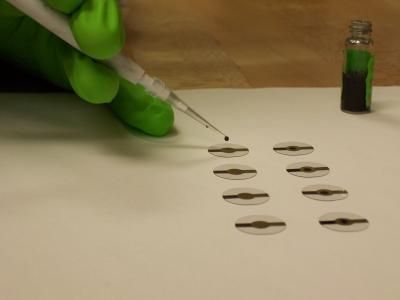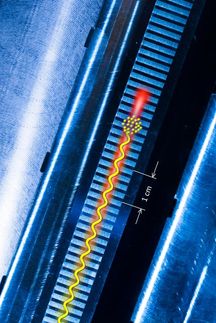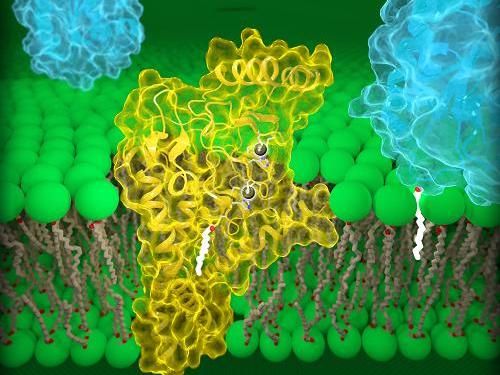Detecting the undetectable in prostate cancer screening
New technology 300 times more sensitive than commercial tests, defines new PSA 'zero'
A team of Northwestern University researchers, using an extremely sensitive tool based on nanotechnology, has detected previously undetectable levels of prostate-specific antigen (PSA) in patients who have undergone radical prostatectomy.
The researchers found measureable PSA levels in each post-operative patient in its study, thanks to the power of the nanoparticle-based bio-barcode assay developed at Northwestern. The technology is 300 times more sensitive than commercially available PSA tests. After the removal of the prostate gland, patients typically have PSA levels that are undetectable when measured using conventional diagnostic tools. This ability to easily and quickly detect very low levels of PSA may enable doctors to diagnose men with prostate cancer recurrence years earlier than is currently possible.
"We have defined a new zero for PSA," said Chad A. Mirkin, George B. Rathmann Professor of Chemistry in the Weinberg College of Arts and Sciences, professor of medicine and professor of materials science and engineering. "This level of sensitivity in detecting low concentrations of PSA will take the blinders off the medical community, especially when it comes to tracking residual disease."
The study is published by the Proceedings of the National Academy of Sciences ( PNAS ). Mirkin and C. Shad Thaxton, M.D., assistant professor of urology in Northwestern's Feinberg School of Medicine, led the study.
The study is an early indicator of how nanotechnology can be used to improve medical diagnostics and early cancer detection. In the case of prostate cancer recurrence following primary surgical treatment, patients with detectable but non-rising PSA levels could be reassured that their cancer will not recur. This reassurance potentially could be delivered much earlier than with conventional diagnostic tools. For patients with increasing levels of PSA, detected before conventional tools are able, doctors could diagnose a recurrence and intervene accordingly.
Furthermore, the effectiveness of post-operative treatment could be assessed by monitoring a patient's PSA levels. Tracking PSA levels early, before conventional tools are able, may allow doctors to validate treatments for recurrent cancer, such as radiation, hormone therapies and chemotherapies. The most effective will be able to keep down PSA levels.
The researchers were able to reliably and accurately quantify PSA values at less than 0.1 nanograms per milliliter, the clinical limit of detection for commercial assays. The lower limit of detection for PSA using the bio-barcode assay is approximately 300 times lower than the lower limit of detection for commercial tests. The PSA measurements were used to classify the patients as either having no evidence of disease or having a relapse of disease.
The Northwestern team is now conducting a similar retrospective study of 260 patients and eventually plans to do a large prospective study.
The ultra-sensitive technology is based on gold nanoparticle probes, decorated with DNA and antibodies that can recognize and bind to PSA when present at extremely low levels in a blood sample. A magnetic microparticle, outfitted with a second antibody for PSA, also is used in the assay. When in solution, the antibody-functionalized particles "recognize" and bind to PSA, sandwiching the protein between the two particles.
The key is that attached to each tiny gold nanoparticle (just 30 nanometers in diameter) are hundreds of identical strands of DNA. Mirkin calls this "bar-code DNA" because they have designed it as a label specific to the PSA target. After the "particle-protein-particle" sandwich is removed magnetically from solution, the DNA is removed from the sandwich and read using a Verigene® ID system, a nanotechnology platform designed to detect and quantify DNA.
See the theme worlds for related content
Topic world Antibodies
Antibodies are specialized molecules of our immune system that can specifically recognize and neutralize pathogens or foreign substances. Antibody research in biotech and pharma has recognized this natural defense potential and is working intensively to make it therapeutically useful. From monoclonal antibodies used against cancer or autoimmune diseases to antibody-drug conjugates that specifically transport drugs to disease cells - the possibilities are enormous

Topic world Antibodies
Antibodies are specialized molecules of our immune system that can specifically recognize and neutralize pathogens or foreign substances. Antibody research in biotech and pharma has recognized this natural defense potential and is working intensively to make it therapeutically useful. From monoclonal antibodies used against cancer or autoimmune diseases to antibody-drug conjugates that specifically transport drugs to disease cells - the possibilities are enormous


























































